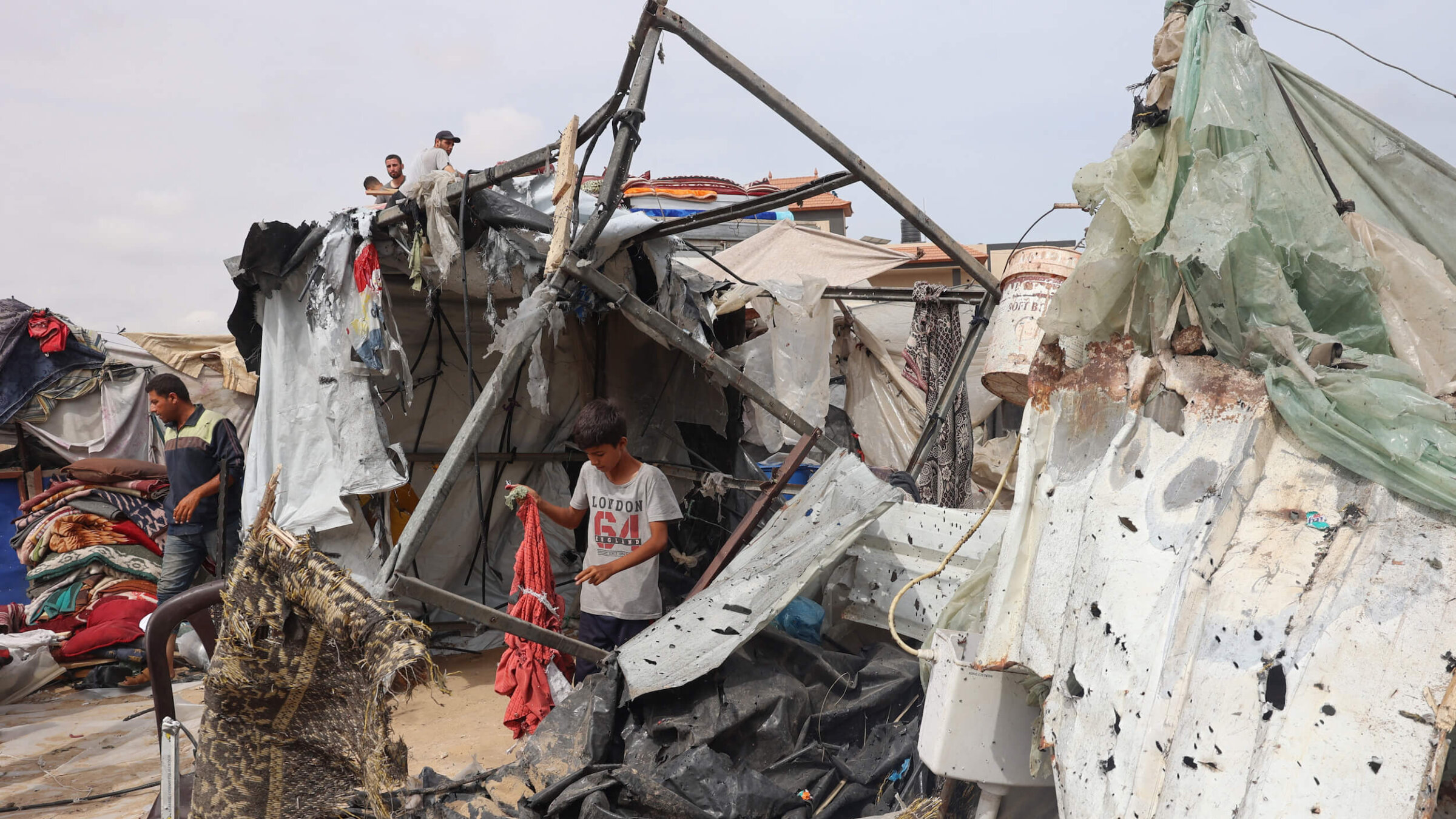My fellow supporters of Israel’s war: We must grieve the horrifying deaths of innocent Palestinians in Rafah
Hamas may ultimately be responsible for civilian deaths, but we are still responsible for our humanity

A Palestinian boy searches the debris of a camp for internally displaced people in Rafah after a strike by Israel. Photo by Eyad Baba/AFP/Getty Images
“I’ve never heard you like this before.”
It was less than a week after Oct. 7, and I was speaking with a friend about my anguish and rage after Hamas’ massacre. I confessed, with excitement, that I expected Israel would obliterate Hamas and take over Gaza with a vengeance. My friend’s response caught me off-guard.
“Listen,” he cautiously explained, “it’s understandable after everything Hamas did for you to feel this way. But I never heard you sound so angry and ruthless before. It’s just not like you.”
I knew immediately he was right. After Israel saw almost 1,200 murdered, with 250 hostages abducted and countless families and communities destroyed, I, like many others, began to see the elimination of Hamas as a raison d’etre. Nothing else mattered.
But that sense of relentless purpose, my friend pointed out, had enabled a new callousness to begin taking over my heart.
After almost eight months of war, those, like me, who support Israel’s war have much too often treated the act of genuinely sympathizing with Gaza’s innocents like a sort of treason, a betrayal of the war we firmly believe is just and justified.
But after an Israeli airstrike targeting two senior Hamas terrorists at a Hamas compound in Rafah also killed more than 40 civilian Gazans living in a makeshift encampment on Sunday, we must remember that the price of victory should not include our human empathy. And yet we are dangerously close to allowing just that.
The horror of war — even in a just war — must disturb us. The devastating videos and photos from Rafah must mortify us. Thousands of civilian lives lost must confound us. Such reactions are the signs of an attuned, healthy soul.
Those of us who support the war, especially, must grieve the civilian deaths in Gaza; we cannot blind ourselves to the war’s brutal consequences.
Hamas’ villainy may ultimately be responsible for innocent deaths, but we are still responsible for our hearts.
Yet I have seen too many avoid that responsibility altogether — even in the face of profoundly disturbing reports from the scene of Sunday’s devastation. “Many of the dead bodies,” one doctor said, “were severely burned, had amputated limbs, and were torn to pieces.” To retort — as I have seen some do — that empathy is futile because civilian casualties are an unfortunate reality of war is a heartless logic.
To be clear: I don’t believe Israel intended for this outcome. I believe that taking Rafah is vital for Israeli security; that asymmetrical warfare makes defeating Hamas immeasurably more difficult; and that Israel takes exceptional measures to protect civilians. I recognize Prime Minister Benjamin Netanyahu’s admission that the civilian toll of this attack was tragic and avoidable, and I await the results of an IDF investigation into the circumstances surrounding it.
And I also believe that our humanity is at stake in this war. We cannot blunt our emotions to the innocent deaths and suffering in Gaza. The Torah frequently lambasts hard hearts, those who are coarse and deaf to the cries of suffering humans. Merciful empathy is a distinctively Jewish trait, the Talmud says. Compassion emulates divinity.
Defaulting to a stance of reflexive self-righteousness — that we, that Israel, do not want any casualties — mistakenly desensitizes us to war’s agony.
Even while recognizing war’s inevitability, the prophets despised it as a necessary evil. They always longed for that elusive future when “nation shall not lift up sword against nation, neither shall they learn war any more.” A war’s validity doesn’t mean we can’t cry through its victory.
This does not negate the ongoing suffering Israelis endure every day of this war. Israelis are still grappling with an extraordinary degree of trauma and grief. I understand why some might insist that our hearts can only hold our own nation’s sorrows.
But I have faith in the human heart’s capacity to hold a difficult and complex grief.
Expanding our empathy to the suffering of civilian Palestinians in Gaza, to their cherished and worthy human lives, is what fundamentally distinguishes us from Hamas.
Hamas extinguished the flame of their humanity long ago — The Oct. 7 massacre affirmed that. We who support Israel take care to cherish our own.
“All who are compassionate toward God’s creatures are clearly among our forefather Abraham’s descendants,” the Talmud says. “All not compassionate toward God’s creatures are clearly not among our forefather Abraham’s descendants.”
Empathy is a hallmark of the Jewish personality — for those near and far from us. Innocent Palestinians suffering horrible, preventable deaths, like those in Rafah, deserve our tears and our heartache, and we are a people fitted to extend such empathy.
A message from our CEO & publisher Rachel Fishman Feddersen
I hope you appreciated this article. Before you go, I’d like to ask you to please support the Forward’s award-winning, nonprofit journalism during this critical time.
We’ve set a goal to raise $260,000 by December 31. That’s an ambitious goal, but one that will give us the resources we need to invest in the high quality news, opinion, analysis and cultural coverage that isn’t available anywhere else.
If you feel inspired to make an impact, now is the time to give something back. Join us as a member at your most generous level.
— Rachel Fishman Feddersen, Publisher and CEO